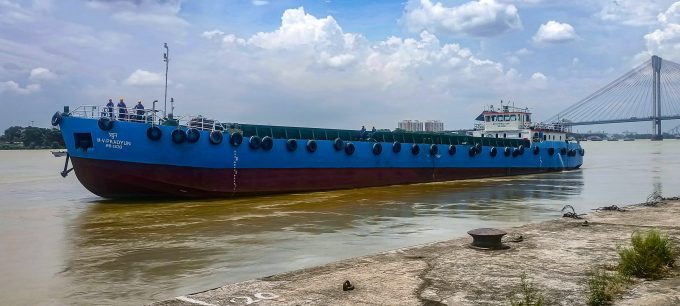Liners unveil Asia-Europe FAK price hikes to arrest steady rate decline
Container shipping lines are looking for a hike in Asia-Europe spot freight rates, announcing a ...

Maersk Line is putting a heavier focus on barges along Indian coastal routes as New Delhi calls for a larger modal shift from land to sea for local cargo distribution and transhipment.
Close on the heels of a Kolkata to Dhaka container-on-barge service for India-Bangladesh cross-border trade, Maersk India has piloted a similar offering on the domestic leg on the Bay of Bengal coast line from Kolkata to Meghalaya – a north-eastern state facing historical supply chain constraints.
Maersk India told The Loadstar, said the pilot run helped it establish the feasibility of this alternative option for hinterland shippers.
“It could be regularised, depending on uptake from customers,” the carrier added.
Maersk said the newroute had been built around the Indo-Bangladesh Protocol (IBP) framework, a government-to-government treaty to facilitate river transport along the Bay of Bengal.
Cargo is barged from Kolkata to Mongla Port in Bangladesh and then sent by truck to the designated Bangladesh-India border point.
“The truck in Bangladesh will hand over the cargo to an Indian truck at the border,” a Maersk official explained. “The trucks don’t cross borders.”
The carrier claimed this multimodal arrangement would present significant reliability and cost advantages for customers, as cargo owners increasingly push for “more for less.”
It said: “The movement [for the north-east India leg] is 20% cheaper than trucking, overall. An even more significant aspect is the safety and reliability of cargo movement, given the region’s geography.”
The cargo-laden truck journey from mainland India into the north-east market via the Siliguri corridor is typically fraught with major challenges due to the hilly terrain and breakdowns are very common.
Maersk India added: “Containerised cargo transport through inland waterways presents several inherent advantages, such as reduced handling costs, easier modal shift and reduced pilferage and damages, thereby enabling the cargo owners to reduce their carbon footprints.”
The carrier, in an earlier study, had put the average cost of moving one tonne of freight over in India by inland waterways at Rs1.19 (about $0.1) per km, versus Rs1.41 by rail and Rs2.28 by truck for the same distance. That measure, however, must be reviewed or considered in the context of a current market impacted by high fuel costs and other inflationary pressures.
With ongoing marine highway developments led by the Inland Waterways Authority of India (IWAI), the government is looking to double its inland waterways cargo share from 6% to 12% by 2025. According to industry data, Indian cargo flows through inland waterways in fiscal year 2020-21 stood at some 88m tonnes.
Stakeholder effort towards greater inland waterway carriage is critical as New Delhi wants to scale down its elevated logistics costs – a major negative factor in the global competitiveness of its exports – by at least 5% over the next five years, from the current estimated 14% of GDP.
In pursuit of that goal, in May 2018, the Indian government liberalised its cabotage law for foreign-flagged vessels to engage in coastal trades, until then the exclusive domain of locally registered cargo ships.
Comment on this article